Recession, inflation… WTF does this all mean, and should wedding pros be considered about rising costs, labor shortages, and a slower economy? There's no doubt that our economy is entering into a recession, but what does that mean for the wedding industry? In this episode of The Power in Purpose Podcast, we discuss the ‘looming recession’ with wedding industry financial expert Michelle Loretta of Sage Wedding Pros.
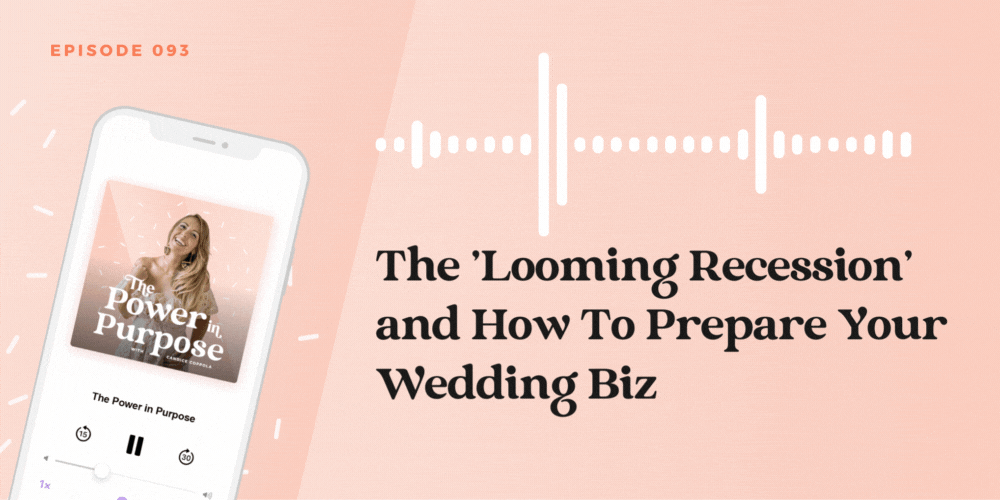
Michelle Loretta is a strategist for the wedding industry and creator of Be Sage Consulting, which you may know as the former Sage Wedding Pros.
Since 2009, she has blended her past as an accountant for Deloitte, a sales and marketing manager for DDLA, a merchandiser for Coach, and a wedding stationery entrepreneur to help events industry entrepreneurs better their businesses.
Be Sage Consulting produces Be Sage Conference, a master-level event for wedding professionals nationwide. Michelle has been asked to speak at a number of industry conferences, including Catersource, NACE Experience, Wedding MBA and The Special Event. She was named to the TOP 1000 Event Professionals by BizBash in 2019.
Michelle is also the winner of the 2021 ILEA ESPRIT best conference award for the Be Sage Conference.

On this episode about a wedding industry recession with Michelle Loretta:
- What are some signs that you should be bracing your business for a slower economy?
- Are we already in a recession? And if so, what does it mean for the wedding industry?
- What is this labor shortage going to look like over the next year and longer? How will that impact your businesses?
- What about inflation? How does that impact your business?
- Do we need to rush and increase our pricing because of ‘inflation’?
[00:00:00.170] - Speaker 1
If you've watched the news, picked up a newspaper, or gotten into money TikTok, then you know there's a lot of talk about a looming recession. And of course, you felt the effects of inflation not only in your business, but also in your personal life with just skyrocketing costs of living. That's why I wanted to record today's episode, and it's why I've brought in our special guest, Michelle Loretta from B Sage Consulting, to talk to us about the recession, a contracting marketplace, inflation, labor shortages, and what all of this means for your small business in the wedding industry. You're here to grow a business, but not just any kind of business. You want to grow a profitable business with purpose. A business where you wake up every single day driven to serve your customers and make a difference in your own life. I'm Candice Copela, public author, business coach, and your guide to building a profitable business with purpose. Join me here every single week as we explore how to build and grow your business with purpose. Get ready to dig in and have meaningful conversations about the strategies and techniques that will help you build your dream business.
[00:01:19.770] - Speaker 1
This is the power in purpose. Hey there, friend. Welcome back to the Power and Purpose podcast. It's me, your host, Candice, and what a great episode we have for you today on the show. I'm chatting with my friend Michelle Loretta on the looming recession and how to prepare your wedding business for what's to come. You have to be living under a rock not to know that things are changing in the global economy. And as small business owners in the wedding industry, I think there are a lot of things that we can do to be prepared for how the economy is going to change. And who better than to guide us to answer our questions, but also to put us at ease than Michelle Loretta from B Sage. Michelle has been working with Wedding Pros for over a decade, and she is the expert when it comes to this industry and money. She is the person that I turn to and look to to tell me what to do. And so it's such an honor to have her on the show today to talk to you and to answer your questions about how you can prepare your business for a looming recession and just really what this all means now.
[00:02:37.640] - Speaker 1
Michelle Loretta is a strategist for the wedding industry and the creator of BSA Consulting, which you may remember as Sage Wedding Pros. Since 2019, she has blended her past as an accountant for Deloitte with her experience running a wedding industry business as a former stationer to help events industry businesses better their business. She also has the BSA conference that she puts on a master level event for wedding professionals nationwide. She's also been asked to speak at a number of industry conferences that you know, that you attend, that you love such as cater source wedding MBA the special event and she was also named Top 1000 Event Professionals by Biz Bash. In 2019, she's hosting the B Sage Conference, which is a master level conference for wedding industry professionals in Sonoma County, California, february 27 through March 1. And if you enjoy this episode and want more of this style conversation, michelle is going to be talking about the economy at the B Sage Conference, along with nine other guest experts that she's put together and curated. The B Sage Conference is one of my favorite conferences because it sort of bridges the gap between what's out there right now and what a more experienced wedding professional needs.
[00:04:09.220] - Speaker 1
There's a lot of great conferences and live experiences for wedding pros that cater to the newer entrepreneur, but there's not so much out there that caters to someone who runs a very robust business and has been in business for a long time. Well, that is what Bsage is all about. If you'd like to learn more about how you can sign up for the BSA conference and of course, register to attend february 27 through March 1. I mean, who doesn't want a business trip to Sonoma County? Picture yourself surrounded by 100 other high level wedding professionals learning, sipping wine, doing California stuff. Doesn't that sound like a dream, especially after the season that you've just had?
[00:04:55.020] - Speaker 2
It does.
[00:04:56.050] - Speaker 3
But listen, if you want to learn.
[00:04:57.310] - Speaker 1
More about the B Sage Conference and get all the details and register, please go to bsageconference.com. I've also linked this inside the show notes for today's episode so that you can go and check out the conference. All right, so you know what we're going to be talking about today. You know that Michelle Loretta is a bad ass in this department. It's what she does with her B.
[00:05:17.670] - Speaker 3
Sage consulting work, working one on one.
[00:05:20.150] - Speaker 1
With wedding industry professionals on the finances of their business. And so let's get into the episode with Michelle Loretta.
[00:05:27.760] - Speaker 3
Michelle, welcome back to the show.
[00:05:29.930] - Speaker 2
Oh, it's so great to be here. I Candace.
[00:05:32.660] - Speaker 3
I'm so happy that you agreed to come back to talk about some of these big topics that wedding fros are feeling, I think, so overwhelmed by. I was just thinking, our people have gone through a pandemic. They have gone through this crazy season in their business over the last two and a half years, and now they're like, what the fuck? Now I have to worry about an economy and a recession and inflation and labor shortages. So thank you for being here to set us straight.
[00:06:02.190] - Speaker 2
It's a lot. It's also fast, too, that's the big thing is so much of what we've experienced in the last few years. Business is typically experienced in the period of like 10, 15, 20 years. That's why it feels so jarring.
[00:06:18.770] - Speaker 3
Yeah, I totally agree. I completely agree.
[00:06:21.370] - Speaker 1
And I think everybody tuning in cannot.
[00:06:24.080] - Speaker 3
Wait to hear what you have to say on the matter. And so I want to jump right in and start talking about what's happening in the world and how we can prepare our wedding business, even if there's anything we need to do to prepare our business for a slowing economy and for inflation and some of the other things that are happening out there in the world. So my first question to you is what are some signs that I should be bracing myself for a slower economy? What are some things that we should be looking for?
[00:06:53.360] - Speaker 2
Yeah. So everyone wants to know, are we in a recession yet? We're not there yet. There's a lot of chatter in economic circles that we are at the precipice of that. So it's hard to say. Typically with a recession, when you're in it, you're in it, and we're not totally there yet. I would say that people need to be looking at a few things. Look at your a lot of it is locally based, right. So look and see what's kind of happening in the real estate market locally when home buying slows down a little bit, that's kind of a sign that things are going to slow down also in consumer buying and the way that people spend.
[00:07:30.990] - Speaker 4
Right.
[00:07:31.700] - Speaker 2
And so certain markets within the United States are starting to see that a little bit. And part of the reason why that's happening is the Federal Reserve has raised interest rates. What that means is that if you want to take out a loan to buy a home or even to buy a car to buy anything, you're going to have to pay more interest. That naturally slows down the economy.
[00:07:50.690] - Speaker 4
Okay.
[00:07:51.140] - Speaker 2
And what's been happening in the last year or so is there's been a lot of spending because interest rates have been so low.
[00:07:57.270] - Speaker 4
Right.
[00:07:57.510] - Speaker 2
So it's kind of something that needs to happen in order for things to readjust a little bit. So when you start to see that real estate market slow a little bit, that's kind of a good indicator that things are slowing down in certain markets in the United States right now, that it is flattening a little bit. So it's like, okay, this may be kind of coming down the pipes. Okay. Another thing to look at is the labor market. Okay. Unemployment rates right now in the last quarter of 2022 are still low 3.5%. That's actually too low of an unemployment rate. You actually want a little bit higher of an unemployment rate somewhere around 5% or 6% so that people can freely move around jobs. Right now, as employers, we're feeling that pinch. Right. 3% unemployment rate means it's hard to find people to come work for us.
[00:08:43.350] - Speaker 4
Right.
[00:08:43.660] - Speaker 2
So when people are employed, they have money they can spend.
[00:08:47.980] - Speaker 4
Right.
[00:08:48.320] - Speaker 2
So that signal is not indicating necessarily that things are very dire just yet.
[00:08:54.940] - Speaker 4
Right.
[00:08:55.210] - Speaker 2
But start to look because it should increase. It's helpful for us for that to increase, but it's not totally there yet. Right. You're going to feel it in your business. People are going to become more cautious with how they're spending right now I'm hearing lots of different things. I don't know about you, Candace. I'm hearing still that people are some people are still in boom mode. Some people are feeling slowness. I try to remind people September, October are traditionally slow booking seasons anyways, so don't panic. This is normal. When you start to feel slowness for periods of six months, nine months, twelve months, you're going to feel like, okay, now we're in the recession, right. So don't freak out. If you're having one or two slow booking months, we're not there yet. Okay. As far as our industry is concerned, we tend to feel the recession slower. So in the last recession, 20 08 20 09 20 10 I remember you were that's when you were starting your business, right? Yeah, started and it's part of my story.
[00:09:59.540] - Speaker 3
I didn't even know we were in a recession. I was like 27. I had no idea what was going on, you know, so I was just doing my thing and I was able to grow a business in a recession. It didn't affect my business.
[00:10:09.490] - Speaker 2
Yeah. So I think that if you have an established business during a recession, it's a little bit harder. You're going to feel it because you're maybe going from a million dollars in revenue a year and you're going to see those sales change.
[00:10:25.530] - Speaker 4
Right.
[00:10:25.900] - Speaker 2
So as business owners entering a recession, because people book out a year in advance, often times we feel it later in our industry. It's not like consumer buying.
[00:10:37.680] - Speaker 4
Right.
[00:10:37.930] - Speaker 2
So consumer buying will feel it more immediately. You'll see it in like holiday sales are down.
[00:10:42.260] - Speaker 3
Right.
[00:10:43.020] - Speaker 2
So that's another indicator that people can be looking at, oh, I'm reading all of these reports, the consumer buying is down for the holidays or whatever, or people didn't buy as much in school supplies, depending on the time of the year.
[00:10:56.610] - Speaker 4
Right.
[00:10:56.920] - Speaker 2
If you start to hear those things you're likely going to see in your wedding business six months later or twelve months later that your bookings are down. Because again, if there's a delayed reaction that happens in our industry because our booking windows are so much further out.
[00:11:11.210] - Speaker 3
Across all things yeah.
[00:11:12.490] - Speaker 2
There's a delayed reaction across all things. Yeah. And fashion and trends and things like that as well.
[00:11:16.680] - Speaker 4
Right. Yeah.
[00:11:17.820] - Speaker 2
So those are some things that you can kind of be looking out for. Last thing I want to say is that this is normal. Markets expand, markets contract. So when we go through a quote unquote recession, it's not a time to freak out. Like this is a normal cycle of the economy. It's not like a shutdown, like COVID that was really hard because business was turned off. Your business is not going to be turned off. You are going to feel that market contraction slowing down a little bit.
[00:11:45.140] - Speaker 3
Sounds like there's a market correction happening because a few months prior, the housing market was just exploding. People were selling homes they loved just because they stood to make so much and decided to go rent until the market came down and they could buy at a better price.
[00:11:59.540] - Speaker 4
Right.
[00:12:00.280] - Speaker 3
And I think for us, when we see explosive growth, whether it's in the economy or in our businesses, we adapt to that growth pretty quickly. So if suddenly you have lots of money coming into your bank account, you think, okay, well, this is the new benchmark that we need to stay at, but it's not guaranteed to keep coming in at the same pace and stay there forever.
[00:12:20.390] - Speaker 4
Right?
[00:12:21.770] - Speaker 2
100%. And a lot of what we're experiencing, that quote unquote wedding boom, part of that is the COVID right? Like, we turned off the hose and all of a sudden we turn it back on and the water is coming out and we're drinking from a fire hose, literally. So there's that factor. But what people don't always realize is that there's a generational boom.
[00:12:43.230] - Speaker 3
Right?
[00:12:43.750] - Speaker 2
We are at that prime age where the millennial, the Gen Y is all in the age range of quote unquote marrying age range.
[00:12:53.100] - Speaker 4
Right.
[00:12:53.350] - Speaker 2
We finally reached that where they're all 23 to 35 or whatever, right. It's a little bit old.
[00:13:01.040] - Speaker 4
Wait.
[00:13:04.170] - Speaker 2
Early 40s. Right. That's such a big generation. From early twenty s to early 40s.
[00:13:10.190] - Speaker 4
Right.
[00:13:10.540] - Speaker 2
Everyone is at that peak marriage. That was going to happen regardless of COVID So we were going to experience a quote unquote boom. And on top of it, you have the fire hose effect of COVID turning the water back on, right. You have all this perfect storm. So people have been really busy getting these weddings online. So that generational impact will continue for the next few years, regardless of the recession, people will still continue to get married. It's more the choices that people make, the budgets that they come with that are going to change during the recession.
[00:13:44.330] - Speaker 3
Yeah, that's an interesting point. So you've already answered my next question. Are we in a recession already? The answer is no, not necessarily.
[00:13:52.820] - Speaker 2
Not completely. If you listen to news, they'll see like, yeah, we're kind of getting there. Some people think that we are not 100%, but in the next year or two. Yes, for sure. I think we were due for one around 2020, to be quite honest. So COVID kind of impacted the way things are. 2020 ish around there. COVID kind of impacted the timing on a market contraction.
[00:14:23.000] - Speaker 4
Right.
[00:14:23.380] - Speaker 2
So it'll happen within the next couple of years, is kind of what I'm thinking.
[00:14:27.560] - Speaker 4
Right.
[00:14:27.830] - Speaker 2
And again, we feel a slow down a little bit later. So general consumer trends, we may start seeing stuff in 2023, and we may not feel those impacts until 2024.
[00:14:39.480] - Speaker 3
Got you. Okay, I think everybody here listening. Well, not everybody.
[00:14:43.660] - Speaker 1
But I think a lot of people, when they hear the word recession, they.
[00:14:46.330] - Speaker 3
Have this picture in their mind of what that means. Like the 1920s breadline red lines. That's not necessarily what we're talking about here.
[00:14:55.970] - Speaker 4
Right.
[00:14:56.590] - Speaker 3
So what would a recession mean for the wedding industry, in your opinion? This is an eventual that you think we're going to experience. We're sort of moving in that direction. You think that we might start feeling some effects by 2024 beyond. But what does that mean for our industry, specifically?
[00:15:13.480] - Speaker 2
Yeah, I had a wedding business in the last recession, so I had a stationary business that I had started in 2004. So by 20 08 20 09. 20 09 is when I really started feeling it. The way that that looked was I was still seeing the same number of clients as a stationery designer, my orders were a lot smaller. So what I saw were people were cutting back on guest list. And so 110%, you will see that people will cut back on their guest list. So where these days, especially post COVID, they want to have a party for 300 people because they haven't been able to party and we're inviting everybody in the world, you're going to go back to smaller guest list. So 150 may become a 75 guest list. So for wedding professionals or wedding business owners, it depends on the kind of service that you offer. If you're a stationary designer, I had the same number of orders. They were just a lot smaller. Catering companies, again, they won't be serving 200 people, they'll be serving 175.
[00:16:20.920] - Speaker 4
Right.
[00:16:21.280] - Speaker 2
And so that impacts our revenue, our income, because as service providers who are off, certain segments are pricing per person, a catering cake, invitation designer, there are other segments that aren't, right? Planners, designers, photographers, sometimes floral designers. It just kind of depends on how they price. If they're pricing per centerpiece, they're going to feel that if they have design fees, they may not feel it as much. So that's how we're going to feel it. It may not necessarily be, again, less clients or less weddings or events that we're doing. It's going to be smaller orders, smaller budget sometimes depends on which income bracket you're working with. And you're working at the top 5% of the income bracket, you're not going to feel it as much. People that have money always have money. They will make different choices with that money, but they may still come to you with a $200,000 wedding budget. They may just spend it differently. Trends will change.
[00:17:24.940] - Speaker 4
Right.
[00:17:25.680] - Speaker 2
Mason, jars, burlap, all of that rustic chic came out of people wanting to appear more simple, even if they were spending $200,000 still on the wedding. So it's like we don't want to be flashy.
[00:17:38.120] - Speaker 4
Right.
[00:17:38.310] - Speaker 2
So trends will change. The middle market is the one that's impacted. So if you're selling to maybe upper middle class, but those are people who risk losing their jobs, who sometimes have salary cuts.
[00:17:53.100] - Speaker 4
Right.
[00:17:53.800] - Speaker 2
And those weddings do get impacted where they may have had $150,000 budget pre recession. Now they're like, well, let's do $80,000.
[00:18:03.690] - Speaker 4
Right.
[00:18:04.250] - Speaker 2
So you'll see that budget constrict?
[00:18:09.290] - Speaker 4
Yeah.
[00:18:09.700] - Speaker 3
That's a large chunk of wedding pros.
[00:18:13.310] - Speaker 2
Yes, it's a large chunk. People become a lot more conservative with spending. So as business owners, again, it depends on what segment of the population we are working with in terms of income bracket. That's how we're going to feel it. To answer your question, you will still have income. It does tend to drop. And so in my experience, I probably lost 20% of my income in those years. And so that's something that I want people to be thinking about, is if you lost ten to 20% of your income, what would that look like?
[00:18:43.190] - Speaker 4
Right.
[00:18:43.430] - Speaker 2
So if you have a million dollar sales income generation, if you lost 20% of that, that'd be $200,000. So you'd go from a million dollar business now back down to $800,000. That's what I want you to be thinking of in terms of what your business could look like during a recession. Okay.
[00:19:02.260] - Speaker 4
Yeah.
[00:19:02.780] - Speaker 2
Still have $800,000, but now you're missing $200,000. What would your business look like if you didn't have that 20%?
[00:19:10.100] - Speaker 4
Yeah.
[00:19:10.880] - Speaker 3
Going back in time a year or two right. And thinking about your staffing levels, what you're providing, what your capabilities are.
[00:19:18.850] - Speaker 1
Hey there, friend. Real quick, I want to share with you how you can sign up for a free trial with Honey Book. Honey Book is everything you need to get business done, and it's trusted by over 100,000 independent businesses just like yours to manage projects book clients send invoices, and most importantly, get paid. If you've been looking for an all in one solution to manage your customers, I want to invite you to sign up for a free trial with HoneyBook. Go to Candace Coppola. Comhoneybook to learn more. And when you sign up for a free trial using the code purpose, you'll save 50% off of your first year's subscription. Honey Book is what I used in my business as a wedding planner, and it helped me land every single sale. It's what helped me build a six figure wedding planning business. It's also what helps me today in my business. Go to Candice coppola.com HoneyBook to learn more. And with the code purpose, save 50% on your first year's subscription.
[00:20:33.690] - Speaker 3
During business growth, people's businesses expand to meet the demand of the customer. And so you may have taken out loans for your business. There are things that you may have done in a growth period that you might have to reconsider, in a period of slowing down or in a period of kind of going backwards a little bit.
[00:20:53.470] - Speaker 2
That thing is the big one.
[00:20:55.200] - Speaker 3
Well, I'd love to talk about that next. So what is this labor shortage going to look like over the next couple of months? The next year or even longer. And how is it going to impact our businesses in the wedding industry?
[00:21:08.320] - Speaker 2
Yeah. So most people right now are experiencing the labor shortage. It's hard to find people to come work, especially in hospitality. Small businesses don't always have the, you know, attractive salary to be able to offer or compete with a larger organization. All that being said, there is a labor shift where people are interested in jobs that are more flexible.
[00:21:33.510] - Speaker 4
Right.
[00:21:33.860] - Speaker 2
So as wedding business owners, I want you to keep that in mind that it's not always about the salary offer that we can make. We have other things that we can offer in terms of flexibility or perks or benefits that larger companies. The flexibility is the big one is a huge one.
[00:21:49.000] - Speaker 4
Right.
[00:21:49.640] - Speaker 2
What I'm seeing is a lot of people are having to extend full time jobs for positions that may normally be.
[00:21:57.180] - Speaker 3
A part time job.
[00:21:58.390] - Speaker 2
I'm seeing this a lot in certain segments, like rental companies. Oftentimes these days they can't find drivers and they're having to create full time driver positions that normally would have been probably part time jobs. Seasonal? Yes, exactly. It used to be seasonal, part time. I mean, even with planners, a lot of planners I'm seeing too may have been a seasonal job. I can't find somebody to come in and fill in. I can't find an assistant anymore. I need to hire a full time person because I need to have that position filled. And so we are opening our businesses to more full time staff. What's going to happen when the recession kind of comes? The jobs aren't going to be as plentiful. We are going to go back to this situation where we are able to offer part time positions again. So it will benefit us a little bit. It may also come at the time where we have to we may not have as much revenue. We may have lost 20% of that revenue and we may need to make cuts.
[00:22:59.520] - Speaker 4
Right? Yeah.
[00:23:00.280] - Speaker 2
So what we're experiencing right now in terms of not being able to find people and sometimes needing to create positions to fill the role in the next couple of years will be less of an issue right now. Again, keep in mind 3% unemployment rate. That's not actually a healthy unemployment rate. What that means is that only 3% of the United States population is looking for work. You need to have around 5% to 6% because that creates like a normal cycle of people looking for work. People looking for workers. Right now there's a lot more people looking for workers than people looking for work.
[00:23:42.780] - Speaker 4
Right.
[00:23:43.100] - Speaker 2
So that's why it's so tight. There are certain markets in the US. Where it's even lower, one and a half to 2%.
[00:23:48.590] - Speaker 4
Wow.
[00:23:50.090] - Speaker 2
That's a sign. That's a red flag that there's just not enough workers in that population.
[00:23:55.460] - Speaker 3
So explain why there aren't enough workers. Why there aren't enough people in the job force, looking for jobs. What are some of the reasons why we're experiencing this? I'm curious.
[00:24:06.020] - Speaker 2
Yeah, well, so much of it comes from in our industry. Let's just talk about our industry because we can talk about so many I know what's happening, but just in our industry, because of this wedding boom, we have so many more weddings and events, and corporate, corporate has really gone gangbusters in the last six to nine months.
[00:24:24.680] - Speaker 4
Right.
[00:24:25.000] - Speaker 2
So anybody who does corporate, so you have so many more events, so much more service, and then you have every segment that comes with it. It's not just the wedding professionals, but it's travel and tourism and hospitality. What's happened as a whole is a lot of boomers have retired. They retired early because of COVID Right? So during COVID people that were maybe like in their early 60s that were going to keep working for another five to ten years, they realized, I think I'm good, I don't think I'm going to go back to work five to ten years. That is a huge segment of the population.
[00:25:03.350] - Speaker 4
Right.
[00:25:03.970] - Speaker 2
And our industry may not necessarily hire that much because it tends to be a younger industry.
[00:25:09.770] - Speaker 4
Right.
[00:25:10.440] - Speaker 2
It's very labor intensive. We need to be able to move. So it's not necessarily that that's our hiring pool, but all of it is trickling down. So a lot of that market, that labor market, that labor availability, it just left. It did not come back. So when you think about teachers, that didn't come back.
[00:25:27.500] - Speaker 4
Right.
[00:25:27.820] - Speaker 2
A lot of it was that early 60s, those boomers that were going to keep working, and they're like, I'm done. People were at home saving. Those same boomers didn't spend money for two years. They didn't have to return.
[00:25:39.850] - Speaker 4
Right.
[00:25:40.700] - Speaker 2
So all of that is flowing down. It's flowing down into our industry. And so, again, we just don't have as many workers available, I imagine, with the fact that there's just so much work. Right?
[00:25:51.710] - Speaker 4
There is.
[00:25:52.240] - Speaker 2
There's a ton.
[00:25:53.090] - Speaker 3
And I think also to maybe people even have moved on from the industry. So you see that contraction of people, young people who would have taken a part time job at a rental company or at a decor company or at a planning company, assisting and supporting. Well, they've moved on in the last three years to something else. And while we were shut down and events were nowhere to be found, people had to find another means. And a lot of workers in the industry, imagine, just couldn't stick around waiting for a catering job to pop up.
[00:26:23.960] - Speaker 2
No. And they found something else that's maybe a little bit more reliable. They don't have to work weekends and they didn't come back. And certain cities, the economics of certain cities really flipped upside down too. So I'm in Miami, and the cost of living here has since COVID doubled. We've had such an influx of northerners people with a lot more money. Higher salaries have moved down.
[00:26:51.000] - Speaker 4
Right.
[00:26:51.380] - Speaker 2
It's become a lot more unaffordable in this city. So we've lost a lot of hospitality. The hotels are really suffering. Host valley tourism has always have always been our key industries from that trickles events and weddings and things like that.
[00:27:03.750] - Speaker 4
Right.
[00:27:04.120] - Speaker 2
And so we've lost a lot of workers that have moved to more affordable cities, that have gone up to the Carolinas. God bless.
[00:27:13.750] - Speaker 3
I'm ready to go there myself.
[00:27:17.370] - Speaker 2
Yes, absolutely. That's a little bit there's so many factors that have gone into this. At the end of the day, we're all feeling it. We're all feeling difficult time finding staffing.
[00:27:28.950] - Speaker 3
Well, what about inflation? Because she just brought that up, and that's something that I think has got a lot of wedding pros asking a lot of questions. And in fact, it was sort of the catalyst for the women in my Mastermind wedding pro insiders to be like, Candace, what do we do?
[00:27:40.480] - Speaker 2
Should we raise our prices?
[00:27:41.560] - Speaker 3
Should we do this?
[00:27:42.070] - Speaker 2
Should we do that?
[00:27:42.820] - Speaker 3
I'm seeing people on TikTok telling me I should raise my price. I should do this. And I was like, Listen, ladies, first of all, I'm not an economist. Do I look like an economist?
[00:27:50.970] - Speaker 2
No.
[00:27:52.390] - Speaker 1
I can tell you that unless you're.
[00:27:53.920] - Speaker 3
Listening to an economist on TikTok, I wouldn't go rushing to raise your price to meet inflation. I don't know if that's the answer, but I'd love to hear from you, Michelle, about inflation, how it's affecting our businesses, and should we be raising our price to meet this crazy cost of living that a lot of us are experiencing right now?
[00:28:12.830] - Speaker 2
Yeah, I think there's a few factors before inflation even comes into play, to be quite honest. There are certain segments of the industry that have hard costs that have gone up significantly.
[00:28:25.590] - Speaker 4
Right.
[00:28:26.020] - Speaker 2
So if you're a stationary designer, you're facing labor shortages. You can't get paper, you can't get envelopes. Your vendors, your printers, their pricing may have gone up.
[00:28:34.390] - Speaker 4
Right.
[00:28:35.020] - Speaker 2
Floral. So when COVID shut down all these floral farms throughout the world columbia, Holland, the agricultural shortages of all the floral and the pricing, that's a hard cost that's impacting floral designers. And as a result, designers.
[00:28:53.510] - Speaker 4
Right.
[00:28:54.090] - Speaker 2
And food costs. Catering companies.
[00:28:56.780] - Speaker 4
Right.
[00:28:57.310] - Speaker 2
Also, rental companies that they may not have inventory buying that they need to do again, that's lumber. Lumber. First, consider, like, what are your hard costs? And cost is only one piece of the pricing equation, so I don't want to get people to stock on it. But that's the first question you should ask. What are my hard costs that have gone up? For planners, it's staff, right. If you have a planner that maybe you brought in at 45,000 and they're asking for 65,000 because they need more to survive, that's your hard cost. You have a cost of labor that has gone up. And I'm seeing that happen with a lot of planning companies. Right now is their staff is asking for more.
[00:29:42.540] - Speaker 4
Right.
[00:29:43.320] - Speaker 2
That is the number one thing that should be impacting your decisions in terms of how you're pricing. Am I able to do I have enough profit margin with these increases and supplies, materials, cost of labor? Right, so that's the first thing. The second factor is the intangible piece of pricing, right? What is the value that you bring red is the market value that you bring to the table. What is your experience, your reputation, the type of service that you offer? How long have you been doing this? How in demand are you? That should really be playing into your pricing decisions as well. If you're looking at your 2023 calendar and you're at 85% capacity and you're almost full, you really should be saying, I should only be taking full scale weddings at $15,000 minimum, or whatever. It depends on your pricing structure.
[00:30:39.270] - Speaker 4
Right.
[00:30:39.620] - Speaker 2
So number one, hard cost. Number two, market factors, including demand.
[00:30:46.230] - Speaker 4
Right? Right.
[00:30:47.280] - Speaker 2
And then number three, this idea of, quote unquote, inflation that to me, it's a harder thing to pin on pricing. Those other two factors should get you where you need to in pricing.
[00:30:58.120] - Speaker 4
Right?
[00:30:58.710] - Speaker 3
Yeah, I agree.
[00:31:00.550] - Speaker 4
Yeah.
[00:31:01.110] - Speaker 3
Also, I feel like for almost small businesses, not just the wedding industry, but the rising cost of goods.
[00:31:09.180] - Speaker 4
Right.
[00:31:10.470] - Speaker 3
As a business owner, you have to sit down and make some really hard decisions, because if you move your pricing to match the rising cost of goods that you need in order to facilitate your job, you might have to take less in your salary because people won't pay any more than what you already charge. And so you're absorbing those costs in your business for a period of time, and you might say, okay, this is temporary. I'm going to absorb these costs for now, and then hopefully it's not forever, but it can go on for a long period of time.
[00:31:43.890] - Speaker 2
That's not sustainable.
[00:31:45.070] - Speaker 3
No, it's not.
[00:31:46.310] - Speaker 2
Absolutely not sustainable. To give you an example, I've seen floral designers is a great example, right. So their cost may have been, on average, 30% of the of the budget.
[00:32:01.890] - Speaker 4
Right.
[00:32:02.150] - Speaker 2
Which is a pretty good strong cost margin.
[00:32:05.260] - Speaker 4
Right.
[00:32:05.450] - Speaker 2
So if your budget is $10,000, you're spending $3,000 on floral.
[00:32:09.620] - Speaker 4
Right.
[00:32:10.430] - Speaker 2
With the cost of increasing floral and materials and containers and things like that, it may have gone up to 45%. So all of a sudden, you've lost 15% of your profits. And like you said, you can sacrifice your salary for a certain point, but honestly, it's just not sustainable. It's not realistic. So you have to be on top of those costs. You have to.
[00:32:32.620] - Speaker 3
Yeah, and I just feel bad because so many pros out there, I mean, they have big hearts and they love their business, they love their clients, and they end up paying for portions of the wedding by not charging the right amount. And you can't do that.
[00:32:47.990] - Speaker 2
You can't gift your clients like that.
[00:32:50.020] - Speaker 3
No, you shouldn't be paying for anybody's wedding unless it's yours or somebody who you gave birth to.
[00:32:57.270] - Speaker 2
And even then that's debatable. They might be on their own there, you know what I'm saying?
[00:33:03.370] - Speaker 3
But I see it time and time again and I know people struggle here so much that finding that balance between their hard costs and what they should charge their customers. So it is just a really rough spot to be in, especially these days with the rising cost of living everywhere. Something has got to give. And just because another person is raising their price doesn't mean that you necessarily need to. I love the tip that you've given to look at two specific numbers and let them lead you in the right direction for sustainability. Just a little side question and maybe I don't know if you can even answer this, but what if somebody does that math and it's still not sustainable for them? Like the number they come up with, their customers just won't pay. What do they do?
[00:33:48.890] - Speaker 2
Honestly, I've seen that before and it really becomes a question of like, is this a business that you can run? You have to ask that question or do you need to change the business model? Sometimes you kind of need to take a step back and say, I can charge X, but my costs are Y and then my expenses are Z and I'm only making $20,000 a year. That's just not enough. I'm sorry. Don't continue under that business model. You either need to back out and honestly, there's no shame in going looking for a job somewhere else. I am a big fan of that. We can do a whole podcast on that. Candace, let's do that one.
[00:34:27.880] - Speaker 3
I agree, there is no shame.
[00:34:29.660] - Speaker 2
There's no shame in that.
[00:34:31.240] - Speaker 3
None at all. You have to enjoy your work and it needs to give back to your life, both financially and in all the ways that you desire it to. And if you aren't making the kind of money that you need to make, or if you arrive at a price point that your customers aren't going to pay, then you need to evaluate whether this business is a profitable business. A lot of businesses aren't, unfortunately. A lot of business ideas aren't unfortunately. And if you need to change your business model to make it profitable, that sound piece of advice. Before we go, I want to talk about do's and don'ts as we enter into this season of slowing, of flattening, and then of contracting. And I want to start with what should we not be doing right now as business owners in the wedding industry? What are some things that maybe we heard somebody tell us to do and.
[00:35:22.410] - Speaker 2
We definitely shouldn't be doing that?
[00:35:24.090] - Speaker 3
Or just what should we not be doing right now?
[00:35:26.330] - Speaker 2
So I see some business owners that, again, because of the wedding boom. They've been doing pretty well over the last year or two, and all of a sudden they have a lot of net income, they have a lot of earnings, and that's impacting how much they're taxed. They are getting a huge tax bill on April 15. Oh, my God. I have to pay $30,000. $40,000? First of all, that's a sign of a successful business. It's a killer. You should talk to your tax accountant about making larger quarterly payments if you're getting that big of a tax bill. So that's a whole other conversation. What I see a lot of people advised on when they have big tax bills like that is go out and spend, like, create more expenses for your business so that you get more write off and you lower your tax bill. That's horrible advice. Don't spend money to save money on taxes. You will spend $100,000 to save $30,000 on taxes. And that doesn't make sense. I'd rather have the money in my pocket and have to pay the taxes on it. And who cares, right? I know the reason why that's horrible advice, especially in our industry, and especially for certain parts of the United States that are seasonal, is you can spend up.
[00:36:37.440] - Speaker 2
Oh, I'm going to go spend $30,000 to lower my tax. But I only have $40,000 of cash in the bank. You'll end up with no cash because you spend everything to lower your tax bill. Yeah. And you're going to need that cash, right?
[00:36:53.910] - Speaker 4
Yeah.
[00:36:54.280] - Speaker 2
It's one thing to say. Oh, I have an ad. I'm just going to prepay it for next year. Okay, that's fine. That's not a big deal. But don't go buy stuff just to lower the tax bill. That's horrible business advice that I see some tax accounts make. Do not do that. The best way you can do that, actually, is creating a retirement plan. Like Solo 401 or an SCP.
[00:37:16.740] - Speaker 4
IR.
[00:37:17.060] - Speaker 2
It depends on how your business? If you have employees, that's a great way to lower tax. But anyway, don't go spend just to save on taxes. Just pay the darn taxes. It's better to have that money in your pocket anyway.
[00:37:27.520] - Speaker 3
I fully agree. I have a tax bill downstairs that needs to be FedExed to the IRS on Friday. So I feel the pain.
[00:37:36.210] - Speaker 2
I feel the pain.
[00:37:37.360] - Speaker 3
Nobody likes giving over money to the government. But the truth is, it would have been taken out of your paycheck every single week if you had a nine to five job. And unfortunately, as a business owner, you just have to pay a quarterly, and you got to get in a good.
[00:37:50.570] - Speaker 2
Habit of doing that.
[00:37:51.580] - Speaker 3
So what should we be doing then, during this unique season as wedding frozen? As business owners to prepare for this eventual recession?
[00:38:00.720] - Speaker 2
I want to see people save ten to 20% of their income. Their revenue?
[00:38:05.110] - Speaker 4
Right?
[00:38:05.500] - Speaker 2
So if you're a business that has $300,000 in sales a year, I want you saving $30 to $60,000, putting it away in your business savings account. If you have a separate savings account or you just keep it in your checking account, you don't use don't get into the semantics. People always asking for those rules. It's really ten to 20% of whatever your revenue is in your business. Again, having this idea in mind, if you were to lose 20% of your revenue during the recession, what this is going to allow you to do is you don't need to make budget cuts overnight.
[00:38:42.720] - Speaker 4
Right.
[00:38:43.160] - Speaker 2
It gives you the flexibility. Chances are you're still going to go through. If you start to see your sales slow down, you're like, things are slowing down. You're still going to make budget cuts. You're still going to be looking at your staffing, looking at expenses that you don't need anymore. But you're not going to have to go into triage mode like we did in COVID, right. We're like, oh, my God, I'm canceling the Netflix and I'm canceling all the things.
[00:39:08.140] - Speaker 4
Right.
[00:39:08.500] - Speaker 3
I know.
[00:39:09.120] - Speaker 2
You don't have to go into triage mode. You have the luxury of time to figure things out.
[00:39:15.800] - Speaker 4
Right? Right.
[00:39:16.770] - Speaker 3
It's such an important thing, having that ability to have that money. There no it's there you have a safety net, and you can make decisions based on what's happening in your business and happening in the industry rather than these reactionary decisions or, you know, just decisions without any options.
[00:39:33.750] - Speaker 2
Yeah, yeah. And listen, for a lot of people, that's an intimidating number. Like, oh, my God. $60,000. How do I do that? I barely can keep 10,000 in there. Just start something small. Even if you're only able to get to the 5% or the 10%, you're better off than maybe you were a year before. So we have time now. That's the fortunate thing. People are still buying. People still do have nice budgets. We still are kind of going through this boom for the most part. Even if there's, like, ups and downs from time to time, use this time to kind of slowly squirrel away that money.
[00:40:09.780] - Speaker 4
Yeah.
[00:40:10.260] - Speaker 3
Great advice. Well, Michelle, thank you so much for joining us on today's episode of The Power and Purpose. This has been such an informative conversation. I feel like I know a lot more about all of these puzzle pieces. I feel way more educated on the matter, listening to you talk about it. Before I let you go, I want to make sure that our listeners know that they can sign up for the B Stage conference and if they've enjoyed this conversation about money and the recession and preparing their business. This conversation is continuing at your conference, right?
[00:40:39.660] - Speaker 2
Yeah, I'm going to be talking about these things. I also am joining with nine speakers who are going to be educating on different topics, but I'm specifically going to be addressing this one, so I hope people will join us in Sonoma February 27 to March 1. Awesome.
[00:40:54.960] - Speaker 1
It's an amazing place to be, and.
[00:40:56.950] - Speaker 3
It'S fantastic for more experienced business owners who can't seem to find the right live educational experience for them. And I love that you have created this experience for people who've been in.
[00:41:09.440] - Speaker 2
The been in business for a fair.
[00:41:11.490] - Speaker 3
Amount of time and just can't seem to find anything past sort of newbie or newer to business experiences. So this experience is great for more experienced entrepreneurs.
[00:41:22.850] - Speaker 2
Yeah, absolutely. And part of it is not just the topics for experienced business owners, but being in a room with people who are facing the same kinds of challenges.
[00:41:31.710] - Speaker 1
Oh, my gosh.
[00:41:32.550] - Speaker 4
Yeah.
[00:41:32.830] - Speaker 3
That's where the magic happens. Speakers are great, and the topics that have been curated are fabulous. But the connections you make, the one on one conversations and just being able to sit next to somebody who totally gets all the bullshit they know what you're feeling. They know what? The email you just got, the person who just quit their job, they know they get it. Just being around those people, creating those connections that live beyond the conference, too, is so worth the investment and time to go.
[00:42:02.810] - Speaker 2
So how exciting. I'm so excited.
[00:42:05.190] - Speaker 4
Yes.
[00:42:05.720] - Speaker 2
It's going to be awesome. Thank you so much for having me, Candace.
[00:42:08.650] - Speaker 3
Of course, Michelle.
[00:42:09.600] - Speaker 2
Anytime.
[00:42:09.930] - Speaker 3
You're welcome back any time. This is your second time on the.
[00:42:12.440] - Speaker 2
Podcast, hopefully not the last.
[00:42:14.270] - Speaker 3
But Michelle, thank you so much. Yeah, I want to thank Michelle for.
[00:42:17.480] - Speaker 1
Being such a great guest on today's.
[00:42:18.910] - Speaker 3
Episode of the show.
[00:42:19.850] - Speaker 1
I don't know about you, but I feel just lighter. I feel so much better after talking to Michelle. She definitely made me feel better about the economic situation that we're facing. I hope that you feel the same way. I want to remind you to check out the Bsage conference, a fabulous live experience for experienced Wedding Pros. Go to Bsageconference.com to learn more. And don't forget that the doors to my Mastermind Wedding Pro Insiders are opening soon. I would love to see your butt on the waitlist.
[00:42:50.960] - Speaker 2
What's holding you back?
[00:42:51.990] - Speaker 1
Or why are you not on the waitlist already? You should be there if you want to learn more about Wedding Pro Insiders and what that mastermind experience is like. Go to weddingproinsiders.com to learn more. Type your name, type your email address, and you, my friend, will be on the waitlist and one of the first businesses to know when the doors reopen for applications. All right, friend, listen, enjoy the rest of your day, and I'm here to remind you, as always, there's so much power in your purpose. Until next time. Thanks so much for tuning in to this week's episode of the Power and Purpose podcast. If you enjoyed the show, be sure to subscribe so you never miss an episode and consider leaving a review. Head over to Power inpurposepodcast.com to access all of the resources, sources, and links mentioned in today's episode. That's power and purposepodcast.com. I'll see you next time.
Sign up to receive email updates
Enter your name and email address below and I'll send you periodic updates about the podcast.
Thanks for tuning into today’s episode of The Power in Purpose Podcast. I want to know– what was your biggest takeaway? Head to my Instagram to join the conversation!
CONNECT WITH WEDDING INDUSTRY EXPERT MICHELLE LORETTA
- Check out Michelle Loretta's website
- Follow her on Instagram
RESOURCES MENTIONED IN THIS EPISODE
- WeddingPro Insiders Waitlist
- Be Sage Consulting
- Be Sage Conference
- Get 50% off Honeybook with this Honeybook Promo Code
Explore More Wedding Industry Resources
- Michelle Loretta On How to Be Financially Smart & Curious In Your Business
- Top 3 Financial Mistakes You’re Making in Your Wedding Business
- How I Started My Business In An Economic Downturn
- Pricing Mistakes You Can’t Afford To Make In Your Business As A Wedding Pro
- Wedding Planners – Should You List Your Wedding Planner Pricing Packages On Your Website?
- How Much Should You Charge As A Wedding Planner? Learn How To Figure Out Your Wedding Planner Pricing
Some of the links used in this blog post are affiliate links. When you purchase something, our company receives a small compensation at no cost to you. This compensation helps to maintain the cost of creating helpful content, like our podcast, so you can build a profitable business with purpose.








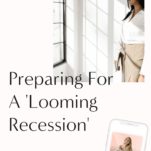
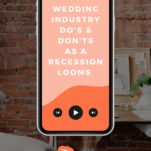
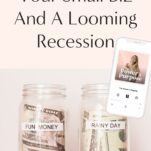
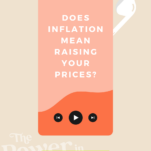
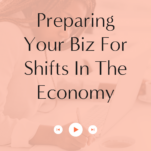
+ show Comments
- Hide Comments
add a comment